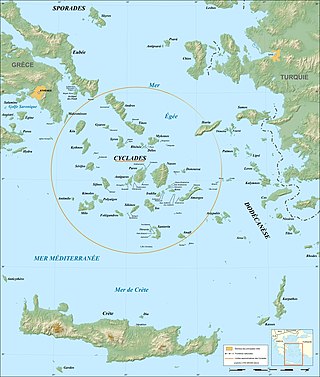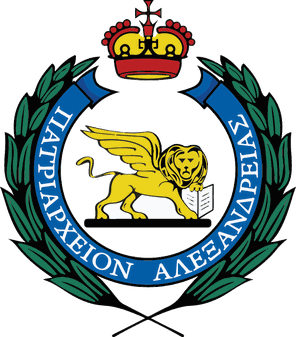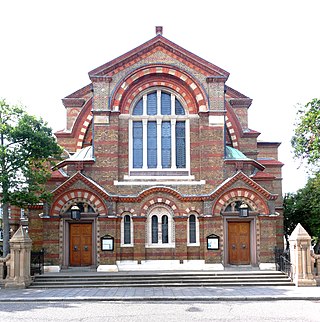History
| Part of a series on |
| Greeks |
|---|
 |
| History of Greece (Ancient · Byzantine · Ottoman) |
Early Greek contact
Mycenaean Greeks
The Mycenaean civilization was an early Greek civilization which flourished during the period between 1600 BC, when Helladic culture in mainland Greece was transformed under influences from Minoan Crete, and 1100 BC, when it perished with the collapse of Bronze-Age civilization in the eastern Mediterranean. Through trading and conquest, Mycenaean civilization spread its influence from Mycenae to many parts of the Mediterranean region and Europe. Mycenaean bronze double axes and other objects (Rillaton Barrow, Pelynt Dagger) dating from the thirteenth century BC have been found in Ireland and in Wessex and Cornwall in England, proving at least indirect Greek contact with Ireland and Great Britain at the time. [2] [3] [4] [5]
Cassiterides
Ancient Greek writers, including Herodotus, mention a group of islands which were called Cassiterides. Modern researchers suggest that they may refer to the British Isles.
Aristotle
Aristotle, in the work On the Universe , mentions the Britannic islands (βρεττανικαί νήσοι), two islands which were called Albion (Ἀλβίων), which is the modern Great Britain, and Ierne (Ἰέρνη), which is the modern Ireland. [6]
Pytheas
The first known Greek to come to Britain was Pytheas who lived in late 4th and early 3rd centuries BC. He reported its name as Prettanike (Πρεττανική) and Brettaniai (Βρεττανίαι), for Britain and the British islands, which became Britannia, it is assumed that its Hellenised version was under Diodorus. It may have been used by some of the local peoples where Pytheas landed to themselves -Pretani.
Roman period
Many Greeks later arrived with the Roman legions as soldiers and traders, and their presence is attested by inscriptions on curse tablets, [7] gravestones and dedicatory tablets in both Greek and Latin displayed in the Museum of London and elsewhere, including:
A ALFID POMP OLVSSA EX TESTAMENTO HER POS ANNOR LXX NA ATHENVI H S EST
"Aulus Alfidius Pompolussa, as stated in his will, his heirs placed this. Seventy years old, a native of Athens, he lies here." [8]
and:
I O M TEMPLVM VETVSTATE CONLABSVM AQVILINVS AVG LIB ET MERCATOR ET AVDAX ET GRAEC RESTITVER
"For Jupiter Best and Greatest, this temple, collapsed through old age, was restored by Aquilinus, freedman of the emperor, a trader, a man of courage, a Greek." [9]
and two dedicatory plaques found in York beneath what is now the railway station. These were erected by a certain Scribonius Demetrius, possibly to be identified with Demetrius of Tarsus, who visited Britain at the time of Gnaeus Julius Agricola: [10]
ΩΚΕΑΝῼ ΚΑΙ ΤΗΘΥΙ ΔΗΜΗΤΡΙΟΣ
"To Oceanus and Tethys, Demetrius [dedicates this]."
and
ΘΕΟΙΣ
ΤΟΙΣ ΤΟΥ ΗΓΕ
ΜΟΝΙΚΟΥ ΠΡΑΙ
ΤΩΡΙΟΥ ΣΚΡΙΒ. ΔΗ[Μ]ΗΤΡΙΟΣ
"To the gods of the governor's headquarters, Scribonius Demetrius [dedicates this]."
As far north as Cumbria, we find the tomb of Hermes of Commagene:
"Let some traveller, on seeing Hermes of Commagene, aged 16 years, sheltered in the tomb by fate, call out: I give you my greetings, lad, though mortal the path of life you slowly tread, for swiftly have you winged your way to the land of the Cimmerian folk. Nor will your words be false, for the lad is good, and you will do him a good service." [11]
Indeed, the Roman city of Carlisle, judging by surviving inscriptions, seems to have been home to a thriving Greek community. [12] It is a matter of historical record then, that Greek was being spoken in England hundreds of years before the English language or Anglo-Saxon peoples ever reached its shores. [12]
Middle ages
Early Middle Ages
In the 7th century, following the death of the previous holder of the post, the Greek Theodore of Tarsus was appointed Archbishop of Canterbury (669 AD); he played an important part in the early history of England, building churches and monasteries and establishing theological studies. [12] According to the Venerable Bede, Theodore contributed to the bringing of a greater unity to English Christianity, and in 672 presided over the first council of the entire English Church, at Hertford. [12] The structure of dioceses and parishes he put in place is still substantially in place today. [12]
Late Middle Ages
The Byzantine ruler Manuel II visited England in 1400, where he was received by Henry IV at Eltham Palace.
A Greek presence in London was recorded with the two brothers, Andronikos and Alexios Effomatos – described in contemporary records as "Grekes" – who were known to have been resident in London in 1440. They were from Constantinople, the capital of Byzantium. [13]
In 1445, the king of England, Henry VI (1421–1471), granted the brothers permission to remain in London and to practise their trade of gold wire drawing. They made a costly type of thread in which thin strands of gold were intertwined with silk, and which was then used in expensive luxury fabrics and in sacerdotal vestments, a craft for which Constantinople had been famous in its heyday. Thanks to this royal grant, the brothers remained in London for many years. [13] They lived first in the area of Cripplegate, much of which is now covered by the Barbican Centre, and later they moved to Broad Street, in what was then the Italian quarter of London. Andronikos, the elder, died in about 1472, but Alexios was still there in 1484, over forty years after his first arrival. [13]
That set the pattern for Greek settlement over the next two hundred years. Some came as soldiers during the reign of Henry VIII, led by the officers Theodore Luchisi, Antonios Stesinos, and Colonel Thomas of Argos, responsible for the garrisoning of the then-English possession of Calais. [13] Some came as visitors for a short period. In about 1545, Nikandros Noukios of Corfu spent time in London and left an interesting account of his impressions. Indeed, he followed as a non-combatant an English invasion of Scotland where the English forces included Greeks from Argos under the leadership of Thomas of Argos whose 'Courage, and prudence, and experience of wars' was lauded by the Corfiot traveller. [14] [note 1] Thomas was sent by Henry VIII to Boulogne in 1546, as commander of a battalion of 550 Greeks [15]
During Henry VIII's reign more Greeks migrated to England from the island of Rhodes following the Knights Hospitaller, after the island was conquered by the Ottomans. A notable Rhodian was the merchant Franciscos Galiardis. [16]
17th century
The descendants of the imperial Palaeologus dynasty carved out a niche as mercenary officers in Britain, and their tombs are still visible in locations as far apart – both geographically and in terms of social standing – as Westminster Abbey and Landulph parish church, Cornwall. [17] [18] A number of Palaeologi fought against each other as high-ranking officers for both sides in the English Civil War. [18]
Early Modern Greco-Britons were not solely soldiers. A few individuals settled permanently, such as a native of Rhodes called Konstantinos Benetos, who was recorded as living in Clerkenwell between 1530 and 1578. These visitors, refugees and occasional long-term residents did not, as yet, constitute a community. They were too few, too obscure and too transitory, and above all they lacked the one thing that would have given them cohesion and a common identity: a church where they could practise their Orthodox faith. [18] Nikodemos Metaxas, a printer by trade, worked in London for a time in the 1620s. Some came as refugees, seeking asylum or financial help as a result of misfortunes suffered under Ottoman rule. One of them was Gregorios Argyropoulos, the owner of an estate near Thessaloniki. [18] When a Turkish soldier was accidentally killed on Argyropoulos' land, the Ottoman authorities held him responsible and forced him to flee overseas and eventually to London in 1633. A charitable collection was made for him in London churches, and he was presented with £48 before he departed the following year. [18]
By the late 17th century, matters had changed. A number of Greeks now occupied prominent positions in London life. Constantinos Rodocanachi of Chios had become one of the physicians to King Charles II (163 I -I 685) (PI. 1). [18] Georgios Constantinos of Skopelos had established the Grecian coffeehouse in Devereux court, just off the Strand, and he could count Sir Isaac Newton and other members of the Royal Society among his clientele. Numbers had also increased. [18] The expansion of Britain's overseas trade with the Levant brought many more merchant ships to the port of London, some of them crewed by Greeks. The time was therefore ripe to press for the establishment of a Greek Church. [18]
In 1676 about one hundred families from the islands of Samos and Melos under the bishop Joseph Georgarinis migrated to England. Assisted by Konstantinos Rhodokanakis they were welcomed by the then Duke of York who later became King James II. They were granted settlements in Crown Str, Soho, later renamed to "Greek Str.".
The first documented organised Greek Orthodox community was established in London in the 1670s, with the first Greek Orthodox Church in London being erected in 1677, [19] in Soho, on the corner of Charing Cross Road and Greek Street. The church was dedicated to the Dormition of the Virgin and was consecrated by the Metropolitan of Samos, Joseph Georgerinis. [19] The founding inscription of the church (dated 1677), among others mentions that the church "was founded for the nation of the Greeks, in the reign of Most Serene King Jacob II". [16]
Oxford also became home to a Greek community centred on what is now Worcester College, which was known as 'Greek College' for much of the 17th century. The Greek College was founded by Lord Paget, then ambassador to Constantinople, though recruitment of Greek students was halted in 1705 because " 'the irregular life of some priests and laymen of the Greek Church living in London has greatly disturbed the Greek Orthodox Church. [19] Therefore the Church has also prevented those who wish to go and study at Oxford.'" [20]

19th century to present
In the 19th century, two events drew Greeks towards Britain; commercial potential after the defeat of Napoleon, and the Diaspora, in which the Greek War of Independence saw a wave of emigres settle in Britain. [20] Initially trading in shipping and commodities, most of these families were from Chios and Constantinople, and settled around Finsbury Circus in London, close to the commercial heart of the shipping industry; the Baltic Exchange and Lloyd's of London. [20] Others settled in the commercial cities of Liverpool and Manchester, [21] [22] and later Glasgow and Cardiff. They were joined by other Greeks from the Aegean, Ionan, Smyrna, Athens and beyond. [20] As they prospered these Greek merchants began to settle in London's Bayswater and established permanent institutions such as the Greek necropolis at Norwood in 1842, a Greek school and the Greek Orthodox church, later Cathedral of Aghia Sophia in 1877. [20]
Britain gained control over Cyprus on 4 June 1878 as a result of the Cyprus Convention and formally annexed it in 1914. Greek Cypriots began to settle in London only from the 1930s. [20] The earliest migrants came to the area around Soho, and many more arrived at the end of the Second World War. As rents in the West End increased, Camden and Fulham became popular areas for Greek-Cypriot migrants. [20] Women initially worked from home in industries such as dressmaking. By the 1960s, a Greek language school and Greek Orthodox church, St Nicholas, had been established in Fulham. [20]





















